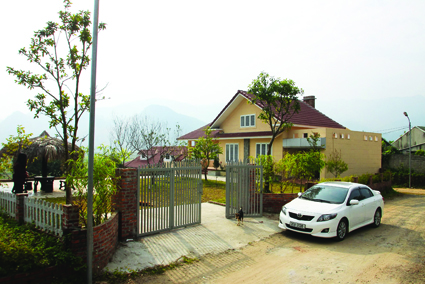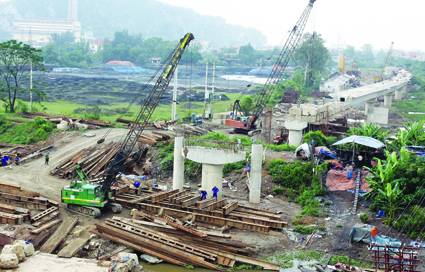With effect from July 1, the new Law on Real Estate Business (the Law) is expected to create an open and equal legal environment for spurring the sluggish real estate business and attracting more foreign investment in this sector.
Composed of 82 articles arranged in six chapters, the Law regulates real estate business, rights and obligations of organizations and individuals conducting real estate business and state management of real estate business.
Compared to the 2006 Law, the Law has many positive changes.
New real estate business activities for overseas Vietnamese and foreign-invested enterprises
The Law adds new real estate business activities that overseas Vietnamese and foreign-invested enterprises may carry out.
 |
Real estate market shows signs of revival with many reasonable housing projects available for customers__Photo: Tuan Anh/VNA |
An overseas Vietnamese may deal in real estate in six forms:
(i) Leasing houses or construction works for sub-lease;
(ii) Investing in building houses for lease, investing in the building of houses or construction works other than houses for sale, lease or hire-purchase, for land leased by the State;
(iii) Investing in building houses or construction works for lease in line with land use purposes, for the leased land of organizations, households and/or individuals;
(iv) Acquiring the whole or part of the real estate project from investors to build houses or constructions works for sale, lease or hire-purchase;
(v) Investing in building houses for sale, lease or hire-purchase, for land allocated by the State; and,
(vi) Investing in building houses or construction works for business in line with land use purposes, for the leased or transferred land in industrial parks or clusters, export processing zones, hi-tech parks and economic zones.
A foreign-invested enterprise may deal in real estate in five forms, instead of just two forms under current regulations, including the above forms (i), (ii), (iv) and (v) and the form of investment in building houses or construction works for sale in line with land use purposes, for leased land in industrial parks or clusters, export processing zones, hi-tech parks and economic zones.
The Law also allows overseas Vietnamese and foreign entities to purchase, lease or hire-purchase houses and construction works of real estate business enterprises. They may provide real estate brokerage service, organize real estate transaction floors, and offer real estate consultancy and real estate management in accordance with this Law.
Higher legal capital for real estate enterprises
As per the Law, an organization or individual that wishes to deal in real estate must establish an enterprise or a cooperative. Its legal capital must be at least VND 20 billion, as compared to the currently prescribed level of VND 6 billion.
Those that irregularly sell, transfer, lease or hire-purchase small real estate are not required the above conditions but must declare tax.
Stricter rules on dealing in future real estate
The Law devotes a separate chapter, Chapter III, to providing dealing in future real estate.
Under Article 54, real estate investors are entitled to sell, lease and lease-purchase future houses or construction works. The current law only allows them to sell this real estate.
To protect purchasers or hirers of future real estate, the Law strictly regulates the mode of payment in the sale, purchase and hire-purchase of future real estate. Accordingly, the first-time payment must not exceed 30% of contract value, and subsequent payments must be in tandem with construction schedule but must not exceed 70% of contract value before houses or construction works are handed over to the clients. For the seller being a foreign-invested enterprise, total payment must not exceed 50% of contract value. Unless the purchaser is granted a certificate of land use rights and ownership of houses and other land-attached assets, the seller may not collect over 95 % of contract value.
To be transacted, future real estate must satisfy the following conditions: possessing land use rights certificate, project dossier and approved construction drawing design, construction permit, if required, after-test acceptance paper on completed construction of technical infrastructure corresponding to the project’s schedule. For condominiums and buildings for residential purpose, after-test acceptance records of the completed building foundations must be available.
Before selling future houses, project owners must have their financial obligations toward their clients guaranteed by capable commercial banks in case they fail to hand over houses as committed.- (VLLF)
